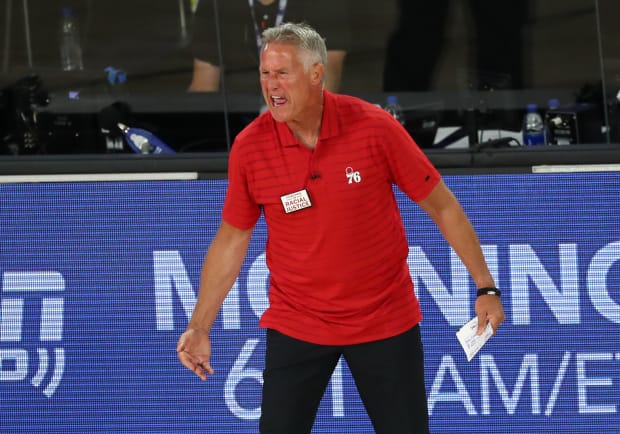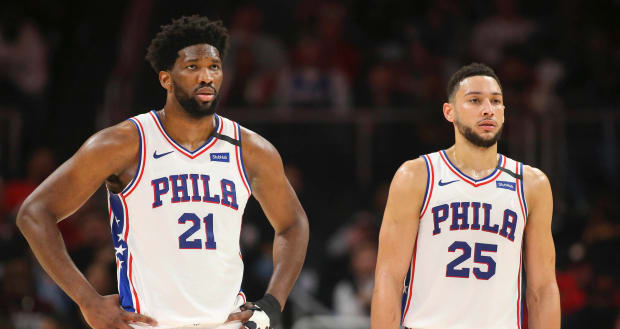Blaming the 76ers coach for the team's faults is like pinning the Titanic sinking on the first officer. Yeah it’s kind of his fault, but the real blame belongs above him.
LAKE BUENA VISTA, Fla. – Hang on, let me get ready: OK—give me all your sizzling hot Sixers takes.
Fire Brett Brown! Oh that’s an easy one. Team gets swept, coach has to go. Brown’s Sixers have had two cracks at Boston in the playoffs over the last three years. In nine games, Philadelphia has won one of them. On Sunday, the Sixers exited Orlando with a four-game sweep.
Trade Ben Simmons! Can’t stay healthy, can’t shoot, can’t play with Joel Embiid. He’s gotta go. Let’s call Golden State, see if Warriors GM Bob Myers is interested in a deal. Andrew Wiggins and LaMelo Ball would look terrific in royal blue.
Knee-jerk reactions happen when a season fizzles. Philadelphia’s, though, figure to be particularly stupid.

Let’s start with Brown, a seven-season Sixers veteran, a man who developed Philadelphia from a 10-win dumpster fire in 2016 into a team that was perhaps one bounce away from advancing to the conference finals last season. Remember that? The Kawhi Leonard miracle shot he got off with Philadelphia’s best defender (Simmons) on his hip and Embiid in his face? That 15-footer takes one more bounce, the game goes to overtime and then what happens?
The lifespan of many coaching gigs is often shorter than a college career, so Brown has had his chances. But Brown has had a stick of dynamite tossed on his roster nearly every season. Three years ago the Sixers were building around Embiid and Simmons, then officially a rookie, with Dario Saric, Robert Covington and J.J. Redick. A year later, the roster was gutted to bring in Jimmy Butler and Tobias Harris. After coming thisclose to beating the Raptors, Philly shrewdly decided to let Butler and Redick walk, re-sign Harris to a five-year, $180 million contract and spend $100 million on Al Horford.
Blaming Brown is like pinning the Titanic sinking on the first officer. Yeah it’s kind of his fault, but the real blame belongs above him.
There will be drumbeats to trade Simmons, and this, too, would be exceptionally dumb. Simmons' body failed him this season. First the back, then the knee, the latter of which cost Philadelphia any chance of competing in the playoffs. Without Simmons, Jayson Tatum—the player the Sixers should have drafted in 2017, when Danny Ainge convinced then-GM Bryan Colangelo that while he hated to part with the top pick, he would for No. 3 and a future first—ran wild, averaging 28 points this series.
“Missing Ben,” Brown said, “will resonate for a long time.”
Simmons and Embiid will never be best of friends, but they aren’t the problem. They need to be teammates, not go to each other’s Sweet 16, and they proved they could do that in a 51-win 2018-19 season. What they need are the right pieces around them, and the Sixers front office has been catastrophically inept at achieving that.

Think about it: Butler is a handful, but he’s a winner, a closer, and if Philadelphia had lavished a five-year, $190 million max contract on him—not outrageous given what they spent on Harris and Horford—chances are he would still be a Sixer. Redick was ready to retire in Philadelphia, until the team couldn’t come up with the cash to match the two-year, $26.5 million deal Redick received from New Orleans, ripping a proven shooter off the roster.
Instead, the Sixers panicked because of how much they surrendered in a trade for Harris and got way too giddy about signing Horford away from the Celtics. Horford was brilliant in Boston, operating often as a small-ball center, but his field goal percentage cratered alongside Embiid, who clearly needs more floor spacers around him.
Brown is going to get fired, because it’s easy, because Philadelphia's bumbling ownership group will look to punctuate a Dale Carnegie-like clinic on how not to build a winner by canning the coach who, if not for a revolving roster might have been able to get them there. Ty Lue is on the market, and there is mutual interest, so Brown has got to go.
Brown knows it, too, with his postgame press conference on Sunday serving more as a postmortem than a preview of what’s to come.
“This season was riddled with an amazing abundance of injuries,” Brown said. “This season was a challenge putting people where they should have been placed. I liked where we ended up, getting Ben off ball, the things that he did as a sort of four man. In general, ending with Ben’s injury this year, you really never felt like you jumped into a routine or a rhythm. That’s probably the thought that will linger the most.”
Brown was asked if the current roster was built to make deep playoff runs.
“I’m not going to answer that question right after a game that we just lost,” Brown said. “It’s true, every team has injuries. I don’t know many that only 19 out of 65 times had the starting group. It was a massive overhaul for me trying to help the team, coach the team. I think this particular series I was worried from the beginning, just because of matchups … I overestimated our ability to get stuck into people and guard wing players with the group that we had.”
Firing Brown will feel good, but it will accomplish exactly nothing. Lue could come, but he can’t bring roster balance with him. Trading Simmons for a cache of picks won’t look so great when Simmons spends the next decade terrorizing them. Philadelphia blew its first chance to build a winner around Simmons and Embiid, but that doesn’t mean they should give up on it. Two stars in their mid-20’s don’t just wander onto rosters.
The challenge is greater now, with a bloated payroll and limited draft capital, but it beats the alternative. An era of Sixers basketball likely ended on Sunday, with Brown likely taking the fall for it. The Process is complete. Let’s see if a new one is any better.